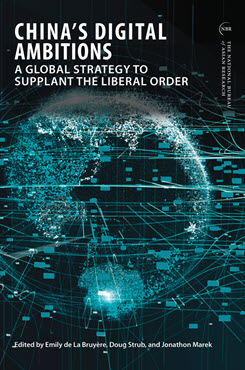Setting the Standards
Locking in China’s Technological Influence
This chapter examines how China, fueled by its unmatched size, centralization, industrial capacity, and resolve, is competing to lead international standard setting in order to control emerging digital markets, as well as to shape technological and commercial evolution.
Download the full report in: French | Japanese | Korean.
Download the Executive Brief in: French | Japanese | Korean.
The project also features an interactive data tool for visualizing the global reach of China’s digital ambitions and the relationships between different forms of Chinese digital influence: Access the data tool here.
EXECUTIVE SUMMARY
MAIN ARGUMENT
Beijing’s digital strategy hinges on setting emerging technical standards globally. Standard setting promises Chinese commercial players an advantage in defining digital infrastructure. In addition, it locks in Chinese influence over emerging digital governance. More broadly, standard setting allows China to shape the future of technological development and commercial hierarchies in an enduring fashion. Beijing pursues its standards strategy through international standard-setting bodies, international investments and commercial footholds, and regional and national standard-setting partnerships. In the process, it benefits from size, as well as centralization that allows it to leverage that size by ensuring coordination among Chinese actors both in developing standards and in promoting them internationally. Unmatched industrial capacity also offers China influence over the commercial ecosystems that develop de jure standards and define de facto ones. And the lure of China’s market incentivizes international players to comply with Beijing’s national standards. China also benefits from the fact that it is actively competing to set international standards, while other countries tend not to. Beijing treats technical standard setting as an opportunity, and strategic imperative, of the digital revolution.
POLICY IMPLICATIONS
- China’s influence over standards is both growing and greater than most analysts recognize. The stakes are enormous for international prosperity and security: standards constitute the rules of new-type geopolitical power in a digital environment.
- No other country is likely to rival the structural advantages that China brings to bear in standard setting. A tit-for-tat competition is unlikely to succeed. Instead, an effective response to China’s standards strategy will demand international coordination among private- and public-sector actors across not only formal standards bodies but also informal commercial and industrial partnerships that shape the standards environment on the ground.
- A competitive response should include pushing for greater transparency in international standard setting, defending against China’s efforts to co-opt cooperation, and promoting a proactive standards development agenda.
Emily de La Bruyère is Co-founder of Horizon Advisory, a consulting firm focusing on the implications of China’s competitive approach to geopolitics, as well as a Senior Fellow at the Foundation for Defense of Democracies and a Nonresident Fellow at the National Bureau of Asian Research.



 Identifying and Countering China’s Global Digital Strategy (Paris)
Identifying and Countering China’s Global Digital Strategy (Paris)

